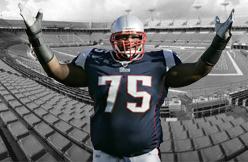True to his word, nose tackle Vince Wilfork will be in attendance today for the first day of Patriots training camp, despite no movement in contract talks. His agent, Kennard McGuire, said yesterday he’s disappointed the situation has come to this.
“Although our dialogue has been ongoing, we just have not achieved the level of comfort for Vince,’’ McGuire said. “In a profession where production and durability equals reward, I’m terribly disappointed that we have not found common ground in what a player of Vince Wilfork’s value truly is.
“Our desire was, and is, a commitment to Vince that equals the one he has made to the organization. Today, we’re just not there. For a man who is as passionate to the game as Vince Wilfork is, I truly feel this is unjust.’’
McGuire would not detail specifics of contract discussions with the Patriots, so it’s unclear what the sticking points are. Per team policy, the Patriots declined to comment on contract discussions.
Wilfork is entering the final year of his contract, and is to earn a base salary of $2.2 million. He initially was set to earn $800,000, but the figure increased because of incentives.
One aspect that boosts Wilfork’s case for a new deal is that he is in the sixth year of a contract he signed as a rookie in 2004, and the NFL no longer allows six-year contracts for players drafted in his position (21st). The maximum contract length is now five years.
As part of the six-year deal, Wilfork received a larger total of bonuses than he would have in a five-year pact - $3 million, in addition to a $2.5 million option bonus. But in exchange for that, he locked himself into an extra year that has cost him leverage now.
Only four players from the 2004 draft class who signed six-year deals have reached the sixth year - Giants quarterback Eli Manning (first overall), Chargers quarterback Philip Rivers (No. 4), Wilfork, and Patriots tight end Benjamin Watson (No. 32).
Wilfork had skipped voluntary organized team activities earlier in the spring as a show of displeasure, but he attended mandatory minicamp (he would have been fined for a no-show). At that time, he pledged he’d show up for training camp, hoping that his approach might create a spark to stagnant contract talks.
To this point, however, it has not resulted in the outcome he hoped for. So the question is what happens next?
Wilfork could play out the final year of his contract - assuming the risk to remain healthy and productive - and hit unrestricted free agency next year, when he could be part of open bidding that leads to long-term security. Yet that assumes the Patriots don’t place the franchise tag on him, restricting his ability to test the open market.
In other situations, which had different dynamics, the Patriots have reached agreements with players that ensured they wouldn’t use the franchise tag if certain parameters were met. Cornerback Asante Samuel, who held out of camp in 2007 after being assigned the $7.79 million franchise tag in his fifth NFL season, was one of them. At this time, Wilfork has no such assurances.
It’s also possible the sides continue to talk and strike an extension later in the year. While that seems like a longer shot at this point, defensive lineman Ty Warren (August of 2007) and center Dan Koppen (October of 2006) are recent examples of players who had their contracts extended during the year.
Another option, also in the longer-shot category, is a trade. A player such as Wilfork could net a significant return, and if the Patriots like what they see from second-round draft choice Ron Brace, perhaps they’d consider selling a stock at its highest point, realizing that a long-term agreement in New England won’t be in the cards.
In past years, as the Patriots have opened camp, holdouts had been a significant story line - Richard Seymour, Deion Branch, and Samuel among those most recently staying away before ultimately earning what they desired. Wilfork went a different route, pledging to show up.
So he’ll be there today, carrying disappointment along with his shoulder pads and helmet to the first practice of training camp.

(boston.com)


